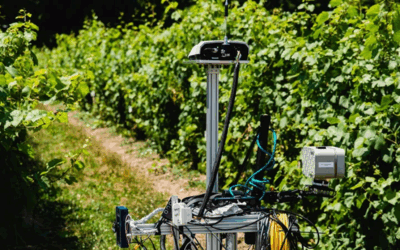Cornell AI News
Cornell is spearheading the development and refinement of AI through extensive interdisciplinary collaborations.
Filter by Topic
SAIL Sets a Course for Smarter Trade Compliance With AI
As tariffs shift and trade regulations grow more complex, a team of Cornell Tech students is developing a smarter solution to address modern trade compliance challenges. Their company, SAIL, is steering into uncharted waters with purpose — and a deep belief that solving the right problem can unlock a new wave of innovation.
Researchers create 3D interactive digital room from simple video
Cornell researchers have developed an AI-powered process that automatically transforms a short video of a room into an interactive, 3D simulation of the space.
Cornell Institute for Digital Agriculture powers 15 innovative new projects
The Cornell Institute for Digital Agriculture (CIDA) has announced the recipients of its 2025 Research Innovation Fund (RIF) faculty and student grants supporting new, cross-disciplinary research projects designed to improve global food systems through digital innovation.
Fei Wang Named Senior Faculty Fellow in Clinical AI at Cornell Tech
Cornell Tech has announced the appointment of Fei Wang, professor at Weill Cornell Medicine, as the new Senior Faculty Fellow in Clinical AI. The newly established role will strengthen Cornell Tech’s leadership in digital health and artificial intelligence, while also expanding interdisciplinary collaboration between Cornell Tech and Weill Cornell Medicine.
Faculty-Led Startup Is Using AI to Reimagine Software Reliability
Cornell Tech Assistant Professor Raaz Dwivedi has co-founded Traversal, a startup emerging from stealth this week with a mission: to transform how modern software systems detect and resolve outages using artificial intelligence.
‘Summit’ on LLMs rallies leading AI experts
Hosted by Cornell’s Global AI Initiative as part of the Thought Summit program organized by the Cornell Center for Data Science for Enterprise & Society, Thought Summit: LLMs and Society is the second of several summits slated this fiscal year at Cornell.
Linking pay to performance boosts AI use in decision-making
Artificial intelligence has improved by leaps and bounds over the last few decades and has changed the way many people, including corporate managers, conduct business. But the use of algorithms in managerial decision-making isn’t universal, and there are a few factors that spur greater use of AI: how the manager gets paid, and how the artificial intelligence is framed, according to a new study co-led by a Cornell researcher.
Bowers faculty outline priorities for federal funding in AI
Artificial intelligence (AI) is reshaping economic systems, geopolitics, and society—and its transformative influence is set to deepen in the years ahead. The United States’ leadership in AI follows a similar blueprint to previous technological revolutions—such as semiconductors and the Internet—where federal investments played a catalytic role.








